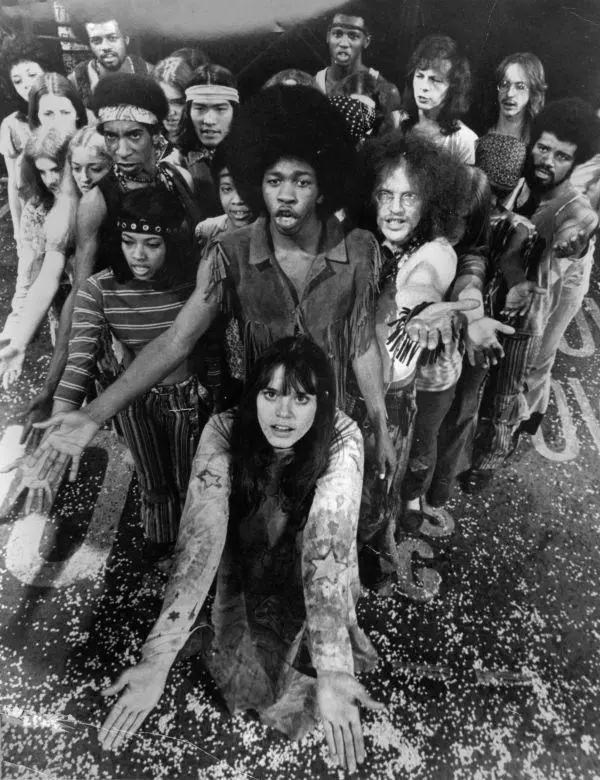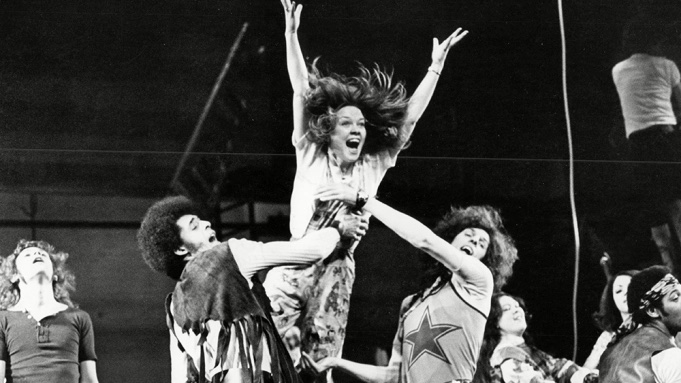Banned in Denver: A look back at the dangerous history of ‘Hair’


Denver police banned the show for nudity; arson killed family members of the touring production in Cleveland
By John Moore
Originally published in The Denver Post on Oct. 2, 2011
In 1971, Denver police would not let the sunshine in. Or anything else to do with the pro-love, anti-war rock musical “Hair.”
The counterculture Broadway freakout, making its way from New York to cities across the country for the first time, had been booked for a week-long run at the downtown Auditorium Theatre. But when the company arrived, Denver police told them to keep right on moving. There would be nothing to see here. Certainly not a brief scene in which some of the actors celebrate the hippie credo of sexual freedom by stripping.
The vice bureau invoked a seldom-used (but still existing) law banning public nudity, as had other cities before Denver.
“They threatened to arrest anyone who showed up on that stage in the nude,” said retired Denver police Capt. Jerry Kennedy. Local promoter Robert Garner faced possible arrest, as well, so he scrambled to move the hot-button show to Boulder’s Macky Auditorium – where it sold out every performance.

By the next year, a dozen “Hair” productions were being performed simultaneously in the United States alone, building a worldwide audience of 30 million people in just four years. Its impact on the social, cultural and political dialogue in the country was unmistakable.
The contradiction between its box-office success and vigilant efforts to stop it wherever it went was a microcosm for a nation divided like a pair of ripped bell-bottoms.
Kennedy said Denver’s nudity law has been in place “since time immemorial,” but he can’t think of any other time it has ever been enforced for a theatrical performance. And he doesn’t see it becoming an issue again when a revival of the 43-year-old musical phenomenon arrives in Denver on Tuesday for a two-week run that will likely stir more fashion nostalgia than fear and trepidation this time through.
“That was a very different time,” said Kennedy. “It was free love, drugs, and rock and roll – all the things that made a lot of people uncomfortable, all in one place.”
War was raging in Vietnam, and Jupiter was not aligned with Mars. Just three months before the aborted “Hair” visit to Denver, cops had dropped tear gas from helicopters on a Jethro Tull concert at Red Rocks.
“Hair” met with resistance all along the line. Church pickets in Evansville, Ind. A fire marshal in Gladewater, Texas, threatened to close the theater. In St. Paul, Minn., a clergyman reportedly released 18 mice into the lobby to frighten theatergoers.
Detractors protested on both artistic and moral grounds, arguing that the show’s treatment of the American flag was both inappropriate and irresponsible in a time of war.
Back on Broadway, where the show had been playing since 1968, astronauts Jim Lovell and Jack Swigert walked out in protest of the flag being turned upside down. The Boston visit was challenged in court on the basis of flag desecration.
Tripp Fountain, a Colorado native who performed in the 2011 national touring production, says that’s a misreading of what that stage moment is about. “It causes some alarm whenever we turn a flag upside-down,” he said,” but that is not disrespectful – it is a distress signal.”
But those and other incidents were trivial compared with what happened in April 1971, when the show attracted a record 80,000 Clevelanders over seven weeks, including the mayor, paying $7.50 each.
In the first week, dynamite was discovered in front of the theater. A few weeks later, during a performance, an arsonist set fire to the hotel where 33 members of the company and their families were staying. Among the seven dead were two wives and two 1-year-old children of cast members.
And all of that played into the cold reception “Hair” got when it arrived in Denver. “It had so much controversy and negative publicity prior to coming to Denver, they were ready for it,” Kennedy said of his vice counterparts.
And not entirely without cause.
Indianapolis had a similar ban on public nudity, and city authorities suggested the actors wear “body stockings, mesh bras or pasties.” Not only did the actors refuse, they decided the closing performance there would be the ideal time to go on a communal, on-stage magic carpet ride.

Tripping on stage
Ted Lange, better known as Isaac the bartender on “The Love Boat,” was an actor on that tour. He says he was greeted at the stage door by the girlfriend of another actor. “She had a palm full of pills, and she was passing them out as the actors went out on stage,” said Lange. “I said no, because I do not do drugs, and she said, ‘C’mon, it’s just speed!”‘
But it wasn’t speed – it was acid.
“Only about six or seven of us refused to take it,” Lange said. “All of a sudden, in the middle of the show, people started talking strange. Some people were laughing hysterically; others were crying. We found out later they wanted all of us to drop acid together as a bonding thing.”
Among his memories of that week in Denver, Garner said, “I do remember there were a lot of drugs.”
Kennedy said that attitude was endemic of a proliferating drug culture that was fostered, of all places, by the highest court in the land.
“The Supreme Court took the lid off drugs back in 1961,” Kennedy said of the Fourth Amendment, which mandated the need for judicially issued warrants to execute searches.
“There was no such thing as a search warrant before then. No one even knew how to draw one up – not even the DA.” But the court’s action, he added, “turned college campuses into sanctuaries for drug use.”
Reaction to “Hair” in those days was not universally confrontational. San Franciscans so embraced its messages that real-life hippies often jumped up on stage. But in Norway, local citizens formed a human barricade to try to block it. In London, a legal challenge to “Hair” there backfired when Parliament issued a ruling that outlawed governmental stage censorship. But in Mexico back in 1969, the cast was expelled from the country on a morals clause.
Whether in 1971 or 2011, the nudity and drug content is still part of the essential “Hair” identity. But Fountain thinks those who would gird their loins over the loins of the show “has maybe not done all their research,” he said.
And he thinks the nudity is more an issue for audiences before they see it than after. The scene was played then in dim light and was virtually invisible. And that irony is not lost on the retired Denver cop. “If you blinked, you missed it,” Kennedy said. “It’s kind of funny that after all that – it didn’t really amount to much.”
John Moore is now the Senior Arts Journalist at The Denver Gazette. The following performance information is for the current stage production now being presented in Golden (2022).
‘Hair’
- What: Stage musical
- Where: Miners Alley Playhouse, 1224 Washington St., Golden
- When: Through October 2
- Tickets: 303-935-3044 or minersalley.com
Leave a Reply